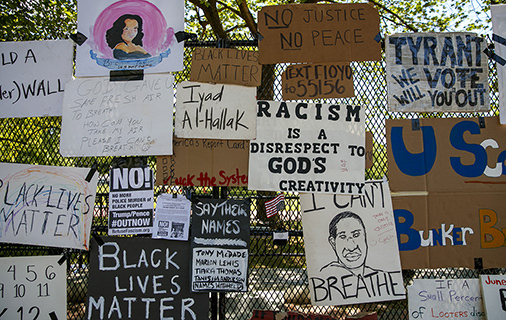—Charles Henry
This innocent country set you down in a ghetto in which, in fact, it intended that you should perish. Let me spell out precisely what I mean by that for the heart of the matter is here and the crux of my dispute with my country. You were born where you were born and faced the future that you faced because you were black and for no other reason. The limits to your ambition were thus expected to be settled. You were born into a society which spelled out with brutal clarity and in as many ways as possible that you were a worthless human being. You were not expected to aspire to excellence. You were expected to make peace with mediocrity.
The quote above is from the essay “My Dungeon Shook—Letter to My Nephew on the 100th Anniversary of Emancipation,” in James Baldwin’s 1963 collection, The Fire Next Time. Baldwin’s letter to his namesake nephew has a painfully familiar relevance today in light of the demonstrations across America in response to decades of racial oppression, the loss of black lives at the hands of police—most recently the murder of George Floyd, but our graveyards tragically attest to so many Black Americans similarly cut down by an almost casual injustice—fanned and abetted by the bigotry of prominent leaders in government.
Like most of Baldwin’s writing, the letter to his nephew is unadorned, searing, and unequivocal. The world he grew up in is essentially the world his nephew inherited, so the elder uncle can attest to the pain, sorrow, and insult of pervasive racism that dehumanizes without respect to any generational divide. He continues:
They [the racists] are in effect still trapped in a history they do not understand and until they understand it, they cannot be released from it…But these are your brothers, your lost younger brothers, and if the word ‘integration’ means anything, this is what it means: that we with love shall force our brothers to see themselves as they are, to cease fleeing from reality and begin to change it, for this is your home, my friend.
The term innocent is salient in this essay and in Baldwin’s writing in general. It does not, I believe, define a guiltless or naïve character. Quite the contrary: it is a soul-burning adjective that conveys an unwillingness of the nation and the majority of the people living in it to take responsibility for their actions, an inability to enter into a new, more equitable social contract, and by so refusing causes the devastation of others’ lives. It is, as depicted earlier in the letter, living without seeing or understanding one’s true history. An aspect of forcing these lost brothers to see themselves as they are is to help them realize the true narrative of their destructive root causes. The past, when seen through this kind of innocence, is devoid of truth and consequence that can in turn foster misprision and wrenching suffering. Ahistorical time recurs irresponsibly, indifferently.

But today there is promise alongside the pain in our streets, in the United States and around the world. The fire this time is both a reckoning and an awakening, a global voice united in protesting the crippling ignorance and culpable innocence that James Baldwin decried. Because engagement with history is essential to our freedom, it is a propitious time to reflect upon the fundamental work of our communities: libraries, archives, museums, and galleries, the composite of memory institutions in service to the public good. We are conversant and critical with the past as a professional mandate, and insist on its preservation, documentation, contextualization, discovery, and reuse both to inform the present and help envision a more charitable future.
While the spotlight will always focus on the broader strokes and dramatic unfolding of current events, it is vital to acknowledge the work of tens of thousands of our colleagues—in particular the vital work of Black and other POC memory workers—who continue to augment this cultural discourse, who strive to assure that this knowledge is made available in an agnostic, unbiased way. This work has been ongoing for centuries, and is not new, but must be foregrounded now as the assault on truth, literacy, science, and accuracy has metastasized to the point of engendering worldwide protest against such lethal innocence.
From our communities, contributions small and large, fleeting and longer term, help us see ourselves and our world through the complexity, nuance, and shadings that exemplify our nature. These contributions might include a well-reasoned answer to a reference question; an accurate metadata scheme; an open repository of well-curated data; a challenging museum exhibit on an overlooked or often misunderstood aspect of history; or persistent diligence to preserve and make accessible marginalized voices.
Collectively, we work on a shared canvas. This work is predicated on the necessity of confronting and rigorously exploring our legacy, not fleeing from it, to build and rebuild a welcoming habitation that is equitable and just. We will persist, for this is our home.
Charles Henry is president of CLIR.

